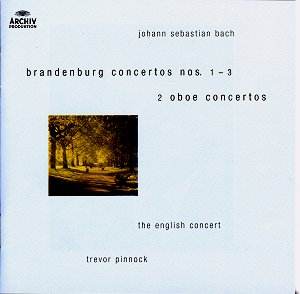In the pantheon of Bach recordings over the past few
decades, Trevor Pinnock's Brandenburgs stand out as some of the most
organically complete interpretations of these works. Recorded in the
early 1980s on original instruments, Pinnock managed to give these concertos
vibrancy and emotion, balancing excellent musicianship with attractive
sound. His small forces give the music a texture that is patently authentic,
and he manages to infuse the works with joy and sensitivity throughout.
Pinnock avoids excesses in either direction - his tempi
are restrained, yet lively. They are neither excessively fast, such
as Reinhard Goebel's recordings (also on Archiv) nor overly slow, such
as Pinnock's many predecessors. One fine example of this is the final
movement of the first Brandenburg concerto, often played at a plodding
pace in undoubtedly an attempt to sound regal. Pinnock's musicians play
this just fast enough to make the minuet sound like a dance movement,
and to make you want to tap your feet. This is no dense performance
à la Richter; the musicians play with light touches and manage
to mix grace and incisiveness.
Pinnock knew how to choose excellent soloists; here
Simon Standage on violin and David Reichenberg on oboe. Their roles
are essential in these works. Reichenberg, naturally, for the oboe concerti,
and Standage who is especially brilliant in the second Branderburg concerto.
This work's opening movement, which is like a showcase for the many
soloists - flute, trumpet, oboe and violin - is a joy to listen to.
The soloists in this concerto of soloists work together perfectly.
The two oboe concerti on this disc are reconstructions
based on two harpsichord concerti. David Reichenberg's unique sound
and phrasing are very attractive, though the tempi of the first concerto
could be a little more inspired. But these weak tempi are more than
compensated by the attractive sound of the strings and of Reichenberg's
oboe. The second concerto is more lively, yet the oboe is drowned out
more by the strings. There is a big difference in the sound of the two
concerti - in the first the oboe is perhaps too forward; in the second
it is a bit too distant.
This is one of the finest recordings available of the
first three Brandenburg concerti. With excellent musicianship, sound
and tempi, they are jewels demonstrating how Pinnock's ground-breaking
work of some twenty years ago still stands among the best. The oboe
concerti are less essential, but the fine sound makes them worthwhile
as well.
Kirk McElhearn
